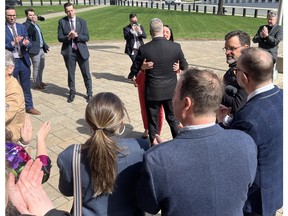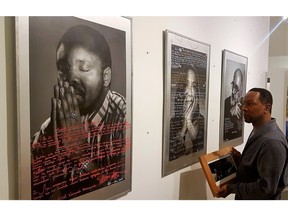
New law will help artists make money, give them respect, say supporters
Holt Liberal government introduces legislation on the status of the artist after years of lobbying from cultural organizations

Article content
As a teenager in the Bronx in the early 1980s, Gary Weekes would hand paint colourful images on the backs of people’s jackets to earn a few bucks.
Advertisement 2
Article content
Soon after, at his New York City high school, he got his hands on his first camera – a Kodak Instamatic 126 mm, what he affectionately calls ‘a plastic thing.’
It was a creative outlet that would lead to better gear and a successful, lifelong career in commercial photography.
But the Fredericton photographer and filmmaker has never lost sight of his fine arts side, one of the reasons he supports a new bill introduced by the Holt Liberal government on Friday that will recognize artists as professionals.
“It gives legitimacy to the arts and we need something like this so that people don’t take the arts for granted,” said Weekes, 59, who lived in England before moving to New Brunswick’s capital with his family 18 years ago.
Article content
Advertisement 3
Article content
In 2022, he became the first Black New Brunswick artist to mount a show at the Beaverbrook Art Gallery, featuring his gritty images from the Fredericton Boxing Club.
“We’ve always grown up with the attitude of the ‘struggling artist,’ and people take advantage of that, despite how important they are. Yes, you do it for the love of it, but you also do it because you want to keep doing it. And for that, it helps to make money.”

The province released statistics Friday in a news release that show where he’s coming from. The latest census data, for instance, suggests that most of the 2,700 artists in New Brunswick were earning less than $40,000 a year. The median personal income of artists in 2020 was $27,400, which is 39 per cent lower than that of all New Brunswick workers.
Advertisement 4
Article content
Six other provinces – Alberta, Newfoundland and Labrador, Nova Scotia, Ontario, Quebec and Saskatchewan – already have legislation elevating the status and recognizing the contributions of professional artists.
The law could help artists earn more, which is why artists’ organizations have been pushing for it for decades. The government wants established fee scales to take effect this fall for artists being hired for projects in provincial government departments or the school system. Arts and culture organizations receiving funding from those departments or schools would be granted a transition period and would have until April 2027 to comply with those fee scales.
During her years in opposition, Liberal MLA Isabelle Thériault repeatedly called for the creation of Status of the Artist Act, after a premier’s task force made the recommendation in 2014.
Advertisement 5
Article content
Now the minister of tourism, heritage and culture, Thériault was emotional on Friday after introducing the new law, which the majority Liberal government is expected to pass easily.
“I’m happy and emotional and there’s wind,” she joked, as tears streamed down her face on a blustery day outside the legislature, where dozens of artists such as Weekes mingled around her. “I’m so happy and grateful to all of the artists who have been advocating for this for more than 30 years. I’m the one who tabled the bill but behind this were so many artists’ associations, cultural workers, the artists themselves, so I’m just really grateful.”
Before going into politics, Thériault spent 14 years on the road on tours throughout Canada, the United States, Europe, Asia, and Africa as the musical director for the groups Ode à l’Acadie, Les Muses and DRUM.
At times, she said, she could have used the support of such a law as a musician. Under its terms, professional associations will accredit artists who meet certain standards. After that, accredited artists hired by the government or organizations with government funding will have to be offered a written contract that respects national fee scales.
“We have to give more importance to the arts,” the minister said. “Many employers pay artists fairly, it’s important to say that. But some do not. And that’s why this bill is important.”
Article content


